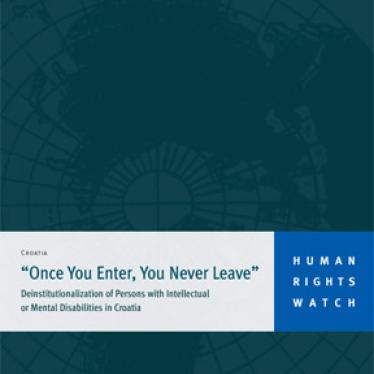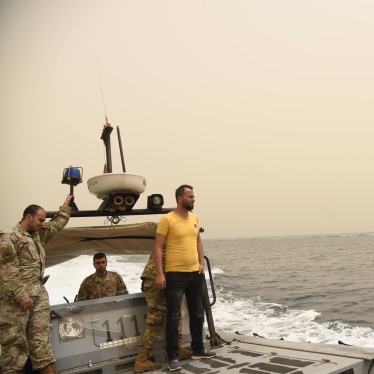(Brussels) - Efforts toward European integration for the Western Balkans are hampered by persistent human rights problems, Human Rights Watch said today. In its World Report 2011, Human Rights Watch documents human rights concerns in Bosnia and Herzegovina, Croatia, Serbia, and Kosovo during 2010.
The 649-page report, the organization's 21st annual review of human rights practices around the globe, summarizes major human rights trends in more than 90 nations and territories worldwide, reflecting the extensive investigative work carried out in 2010 by Human Rights Watch staff. The Western Balkans chapters highlight the region's mixed progress toward accountability for war crimes, abuses against Roma ethnic minorities, lack of progress on support and assistance for refugees and the displaced, harassment of journalists, the rights of people with disabilities, and country-specific issues.
"Everyone can agree that European integration is the goal for the Western Balkans," said Benjamin Ward, deputy Europe and Central Asia director at Human Rights Watch. "But governments in the region need to understand that a greater commitment to human rights is an essential ingredient of those European aspirations."
Inadequate accountability for war crimes remains a key issue in the Western Balkans, the report says, both in terms of cooperation with the International Criminal Tribunal for the former Yugoslavia (ICTY) and national war crimes prosecutions:
- Croatia has increased the number of investigations of war crimes committed against Serbs by the Croatian Armed Forces during the country's 1995 war. But Serbs remain the majority of defendants in war crimes prosecutions, many in absentia, and concerns over bias persist.
- Bosnia and Herzegovina's war crimes trials continue both at the war crimes chamber in Sarajevo and in the local courts, but they face numerous impediments, including staffing and funding shortages.
- Serbia made progress in cases before its own courts, including the trial of nine men accused of killing more than 40 ethnic Albanian civilians in the Kosovo village of Cuska (Qyshk in Albanian) in 1999 by Serbia security forces during the NATO bombing of Yugoslavia. More than 1,000 ethnic Albanians from Kosovo remain missing since the war.
But progress in Serbia's courts has been overshadowed by the continued failure to arrest the Bosnian wartime military leader Ratko Mladic, indicted for genocide at Srebrenica, despite repeated pledges to do so. More than 7,000 men and boys were killed around the town by Bosnian Serb forces in 1995, Europe's worst atrocity since the Second World War.
- In Kosovo, investigations and prosecutions for war crimes and organized crime remain slow and erratic, despite the European Union's mission to help develop legal institutions and support the rule of law (EULEX). The EU mission should thoroughly investigate the credible allegations of abductions, transfers to Albania, executions, and possible organ trafficking by some senior members of the Kosovo Liberation Army after the war, as described in a report by the Council of Europe special rapporteur Dick Marty, which goes to vote on January 25, 2011, at the council's Parliamentary Assembly. To ensure the effectiveness of the investigation, EULEX should appoint a new, senior special prosecutor and revamp Kosovo's program for witness protection.
"The Council of Europe report underscores the need for an effective and credible international investigation, with full cooperation from the authorities in Kosovo and Albania, and backing from the US and EU governments," Ward said. "But Serbia also needs to make sure that it helps find all missing persons and that Srebrenica victims don't wait another year for justice. That requires ongoing pressure from Brussels and Washington."
Across the region, Roma and other ethnic minorities remain marginalized and vulnerable to discrimination. In Belgrade, the government evicts Roma from informal settlements, but does not provide them with other options for housing or information about where they can get assistance.
In Kosovo, Roma and Albanian-speaking Askhali and Egyptians also face persistent discrimination and some of the highest unemployment and infant mortality rates in the region. Their plight is exacerbated by ongoing deportations to Kosovo of Roma, Ashkali, and Egyptians from Western Europe, with little assistance for those sent back.
Many Roma are in Germany, where the state of North Rhine Westphalia has temporarily suspended returns for the winter.
"Forced returns, especially in the absence of effective assistance, are worsening the situation for vulnerable minorities, especially Roma, Ashkali, and Egyptians in Kosovo," Ward said. "Authorities in Germany and elsewhere in Western Europe should halt forced returns of minorities to Kosovo until there are adequate reception and reintegration conditions."
There was little progress toward durable solutions for displaced persons and refugees in the Western Balkans during 2010, the report says. The number of voluntary returns of refugees continued to dwindle, and there are significant impediments to reintegration. These include property repossession, discrimination against ethnic minorities in public employment, and harassment and violence against minorities.
The closing in October of a lead-contaminated camp in Northern Kosovo that had been occupied by displaced Roma for a decade and steps toward providing them with alternative housing, job opportunities, and medical treatment, showed what a greater commitment and integrated approach can deliver, Human Rights Watch said.
There was also little progress on addressing the rights of people with disabilities. Human Rights Watch said. In Croatia, more than 9,000 people with intellectual or mental disabilities live in institutions that deprive them of autonomy and the opportunity to live full lives. The number of institutionalized individuals has grown, despite Croatia's commitments to the United Nations and the EU to provide community-based housing and support services. In Serbia, the authorities have blocked access for organizations seeking to monitor and report on conditions in institutions for people with disabilities.
The harassment of independent journalists remains a serious concern, Human Rights Watch said, with incidents of verbal and physical harassment of journalists recorded in Bosnia, Croatia, Serbia, and Kosovo during 2010.
Other specific concerns identified in the report include:
- Croatia's failure to meet requirements for responding to migrants and asylum seekers, including a lack of adequate protection for unaccompanied migrant children;
- Bosnia's policy of indefinitely detaining terrorism suspects it has stripped of their Bosnian nationality and efforts to deport them to countries where they face the risk of torture; and
- The continuing intolerance toward lesbian, gay, bisexual, and transgender people in the region, evidenced by the violent protests surrounding the Belgrade Pride Parade in the Serbian capital in October.








